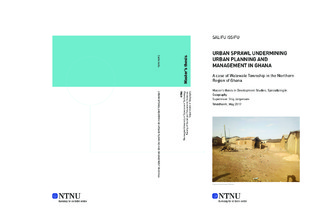| dc.description.abstract | Globally, urban growth and development has been unprecedented in the early 21st century in both the developed and the developing world. Ghana, experienced rapid urban growth without urban planning after colonialism creating a messy urban sprawl in many cities. This study sought to assess land use regulations for achieving a sustainable urban development and the role of city managers in managing urban sprawl in Walewale.
The general assumptions were that, lapses in traditional and central governance system were responsible for urban sprawl occurrence and the phenomenon could be remedy, when corrective measures are employ. The study employed theories of urban sprawl theory, sustainable urban development theory and sustainable urban planning theory, to explain conceptual framework and issues raised. The study is purely qualitative research, where both primary and scanty official available secondary data were gathered. I interviewed 16 primary household heads and nine key informants made of seven chiefs and two-male planning officers through semi-structured interviews. Twelve male-participants and eight female-participants focus group discussions were also conducted as well as personal observation on the field.
Additionally, the study area concentrate on the political, physical and socio-demographic characters of the Walewale. Walewale urban population growth from 2000 to 2010 accounting for 39 percent of the urbanizing district because of its administrative functions in employment generation due to educational and healthcare facilities demand for labour force and other urban service delivery.
The analysis of the study, concentrate on, urban land institutions and their functions, the dynamics of land tenure system, where history played a major part in urban sprawl phenomenon and growth. Again, the spatial distribution of social infrastructure like water, electricity, waste management and many more became necessary because those critical services enhance the livelihoods of the people and how to improve them. The general trend observed was planned areas have improved services and unplanned areas were deteriorating in service delivering.
Finally, conclusions and recommendations dwelt in strengthening the structure of both local and central government systems through urban regulations such as tax policy, urban ordinances, urban zoning, GIS Maps, and public land acquisition and management were recommended as control mechanisms. | nb_NO |
